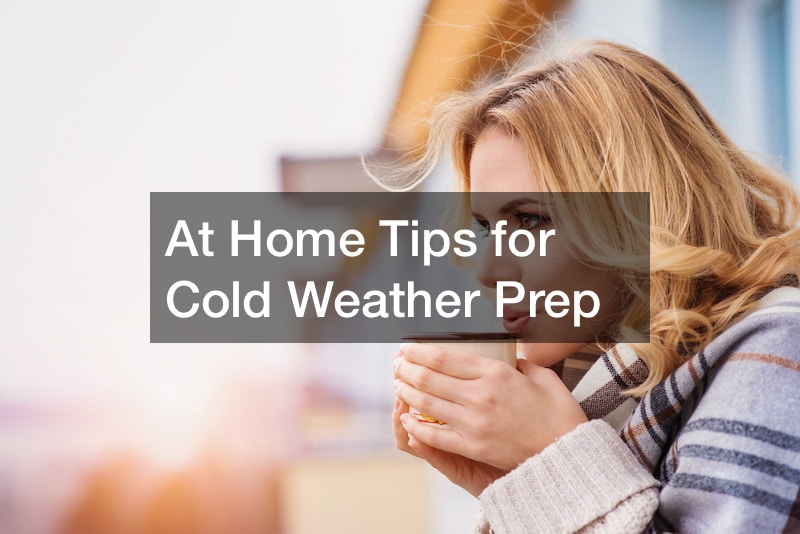

Regardless if you love winter or not, it comes every year. With it comes to snow, ice, and freezing cold temperatures, depending on where you live. This weather can be brutal and wreak havoc on your home. You can prepare yourself and your house for the onslaught of fierce and damaging weather. If you follow the home tips for cold weather presented in this guide, you will be in a good position to be prepared for whatever winter brings.
Keeping Out the Cold
It goes without saying that you do not want your heater to break down in the winter. Unfortunately, it always seems to happen on the coldest day of the year. However, there are some ways you can prevent that from happening to you. One of the top home tips for cold weather is to have your HVAC system cleaned and inspected before the temperature turns cold. You can expect a heating system to last from 12 to 15 years, but some last as long as 20 years or longer. On the other hand, some units have died after 10 years. It is hard to tell just how long your unit will last. However, there are some steps you can take to get the most life out of your system.
You should contact heating contractors to provide some services to prepare your unit for winter. These services include replacing your filter. The filter should be changed every season to ensure it functions properly. The filter collects debris, dirt, dust, and much more throughout any season. To ensure the cleanest air is coming into your house, be sure to have those filters changed. It would be best if you dusted your vents and registers on a regular basis. This helps remove any build-up on them that either prevents air from coming in or blows in with the air. You should ensure that your registers are open all the way and there is nothing blocking them. You want to move furniture, boxes, and anything that is sitting on them and blocking airflow.
Walls and Windows

Another one of the great home tips for cold weather is ensuring that your house is properly insulated. When there isn’t proper insulation in your house, you can feel cold spots and pay higher heating costs. Proper insulation ensures your house stays warm and comfortable and is energy efficient. Some of the areas where you should pay attention include attics, exterior walls, garages, and any areas where there are leaks. You can consider many different types of insulation, including spray foam insulators.
There are some other ways that are not insulation that can help seal up drafty areas around windows. These unique techniques include using rope caulk which is soft and can be molded to fill in any gaps you see. You can also remove this caulk at the end of the season or when you’re ready to do something more permanent. Believe it or not, you can use nail polish to fill in any crack. Even better, the crack is filled in invisibly when you use clear nail polish. There are other methods, including using shrink film to seal the drafts from the windows. This technique takes a little more time and effort to get right. You can also use weather stripping or a draft snake to help prevent drafts from coming in through the windows.
Utilizing the Garage
When the cold weather rolls in, we want to be able to park our cars in the garage. This helps to keep snow from covering them when it covers the ground. In addition, parking your car in the garage helps to limit the amount of frost on the car and makes it more pleasant to get in your car on those cold and windy days. Unfortunately, many people do not use their garages for their vehicles because they are often storing many other items. Great home tips for cold weather also include using some creativity to clean up and organize the items in the garage if it’s cluttered. In the winter, it’s important to be able to park your car there to cut down on snow removal labor and protect it from the elements. There are many garage storage solutions to help you organize the items in your garage and get them off the ground. For example, you can create a hanging system where things like tools and bikes are hung on the wall or ceiling, and not in the way of your car.
Another great tip is to go through your garage and get rid of the items you don’t need or use. Often, the garage becomes a holding place for all the items we never use. Before the winter hits, go through your garage and clean out those items. Once you get the inside of your garage cleaned, you should focus on the garage doors. Cleaning out the inside does you no good if you can’t open your garage doors. Just like any other door, your garage doors need some attention and care. You should inspect them regularly, and if you believe you need garage door repairs, don’t delay. It would be best if you had your garage doors serviced as soon as you notice there is a problem.
Hot Water

Just like you don’t want your heater to die in the winter, you don’t want your hot water heater to go, either. If you had to deal with some cold water for a while, the hotter months are definitely a better time for that. This is why water heater care is one of the top home tips for cold weather. If your hot water heater is hot to the touch, it needs some extra attention. You may not need water heater repair, but it could use service. If your water heater is not insulated, you should do that before the cold weather months approach. When your hot water heater is not insulated, the water sitting in the tank can cool. This means the heater has to heat it again when you want to use it. This increases the costs of your electricity or gas. If you have an older water heater, it may lack the built-in insulation that comes with newer models. Your water heater may need a cover. It is best to contact a professional to determine which size cover it needs.
In addition, it is always a good idea to drain your hot water tank at least once or twice per year. This helps remove calcium and sediment that can build up. When there is a significant amount of build-up in the tank, it reduces how efficiently it works. Once it is completely drained, it can be flushed to remove all the sediment. You should also check the temperature of your water heater to verify it is set between 120 to 140 degrees Fahrenheit.
Winter Water Safety
A service coming into your home that is easy to forget is your plumbing. This makes paying attention to your plumbing systems one of the top home tips for cold weather. When you reach out to plumbing contractors, there are some areas in your house to which you want to pay attention. For example, if you have a sprinkler system, you should ensure that it has been winterized and shut down for the winter. To have your sprinkler system winterized, the lines must be blown out to ensure the lines don’t get broken during the winter season. This protects them through the winter so that they will be available for use in the spring. While you are winterizing the outside of your house, you want to pay attention to the water basins. Water basins are the technical name for the spout where a hose attaches to the outside of your house.
If they are left on and unprotected, they can freeze and split during the winter. Not only does this cause a problem at the site, but it can also cause flooding in your home. You want to turn off the water that goes to the faucet on the outside of your house. Before you turn off the water at the faucet, you should also drain the water from the faucet. In the spring, you can turn the water back on.
Common Risks

An item that you may not expect to see around your house is mold. For this reason, you may not be on the lookout for it or even know what to look for. One of the best home tips for cold weather is to look for mold inside and outside of your home. Mold can thrive in warm and moist environments. With winter comes rain, snow, and ice, which also brings additional moisture. Higher house temperatures create a warm and moist area for mold to grow. If you believe you have mold growing in your home, you should contact mold remediation specialists right away. You can take some steps to help reduce the risk of mold in your home.
You can control the amount of humidity that you have in your home to help stop the growth of mold. When you have dry air in your home, mold is less likely to grow. Other ways to control the humidity in your home include taking cool showers, don’t leave wet towels or clothes around the house. You can also use a dehumidifier in your home to reduce the risk of mold growth. Mold builds up in specific areas, which is helpful if you pay attention to them. These areas include windows, showers, kitchens, and bathrooms. You should make sure that all of these areas are clean and dry at all times.
Winter Pests
When the temperature turns cold during the winter, you aren’t the only one that wants to be inside. Rodents and pests come into homes during this time to stay warm and dry during the winter. In addition to not liking having pests in your home, they can make a mess of the walls and insulation while trying to get in. One of the best home tips for cold weather is to prevent rodents and pests from coming into the house to make a home. The best way to do this is to seal all holes and cracks in the house that a rodent can fit through. It would be best if you replaced any loose weatherstripping around windows and doors. It would be best if you also considered keeping wood 20 feet away from your home. This will all help keep pests away.
In addition, contact pest control services to do a thorough inspection of your home to look for entry points. These services can apply chemicals that keep pests and rodents away from your home. They will check your house to ensure trees are trimmed back and the gable vents are whole and not damaged.
Peace of Mind

Another one of the important home tips for cold weather is to review your homeowners’ insurance. Right before the weather turns to winter, cold is a great time to review your insurance. If you are concerned about your current coverage, you should contact other insurance agencies to see what they can provide. If you made any updates or renovations to your home, you want to ensure your insurance provides appropriate coverage. This is also an ideal time to determine how well your insurance covers any winter damage that might occur. You want to ensure you are protected against damage from fire, ice storms, ice dams, and trees. Every policy is different, and you want to make sure your insurance continues to provide appropriate coverage. It’s essential to remember that insurance is not set and forget it. You should review it annually.
These home tips for cold weather will help you prepare your home for what’s to come with winter weather. You can’t prepare for everything, but these tips put you in a good place. Once you winterize your house, you can feel more confident about heading into winter.


